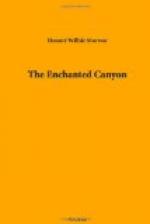Enoch’s face reddened. “I don’t know what there is about a piece of work like this that gets under my skin so intolerably!” he exclaimed. “Whether it’s the cruelty of it, or the dishonesty or the brute selfishness, I don’t know. But we are going to answer this, Abbott.”
“How shall we go about it, sir? We might find out if Cheney knows these men personally and have him make a statement.”
“Have him tell of their previous records,” said Enoch. “Let the world know the heroism and the self-sacrifice of those men. And at the end let him give the lie direct to the Brown papers. Tell him I’ll sign it for him.”
“That will give Brown just the opening he’s looking for, Mr. Secretary, I’m afraid,” said Abbott, doubtfully. “I mean, your signature.”
“I’m ready for Brown,” replied Enoch shortly.
Still Charley hesitated. “What is it, Abbott?” asked the Secretary.
“It’s Miss Allen I’m thinking about,” blurted out the younger man. “You’ve gone through the worst that they can hand to a man, so you’ve nothing more to fear. But if they bring her into it again, Mr. Secretary, I’ll go crazy!”
The veins stood up on Enoch’s forehead, and he said, with a cold vehemence that made Abbott recoil, “If Miss Allen’s name is brought up with mine in that manner again, I shall kill Brown.”
Charley moistened his lips. “Well, but after all, Mr. Huntingdon, Harden and Forrester are just a couple of unknown chaps. Is your championing them worth the risk to Miss Allen?”
“Miss Allen would be the last person to desire that kind of shielding. I’ve reached my limit, Abbott, as far as the Brown papers are concerned. They’ve got to keep their foul pens off the Department of the Interior. I’d a little rather kill Brown than not. Why should decent citizens live in fear of his dirty newsmongers? Life is not so sweet to me, Abbott, nor the future so full of promise that I greatly mind sacrificing either.”
“It’s just—it’s just that I care so much about Miss Allen,” reiterated Charley, miserably and doggedly.
Enoch drew a quick breath. The two men stared at each other, pain and hopelessness in both faces. Enoch recovered himself quickly.
“I’m sorry, my boy,” he said gently, “but life, particularly public life, is full of bitter situations like this. Brown must be stopped somewhere by somebody. Let’s not count the cost. Get in touch with Cheney and have that statement ready for the morning paper.”
He turned back to his letters and Abbott left the room. Before he went home that night, Enoch had signed the very readable account of some of Harden’s and Forrester’s exploits in the Survey and had added, before signing, a line to the effect that the slurs and insinuations regarding the two men which had appeared in the morning papers were entirely untrue.
For several days there was no reply from the Brown camp. Enoch’s friends commented to him freely on his temerity in deliberately drawing Brown on, but Enoch only smiled and shrugged his shoulders, while Curly’s statement lay unopened in his drawer. But underneath his calm, the still raw wound of Brown’s earlier attack tingled as it awaited the rubbing in of the salt.




